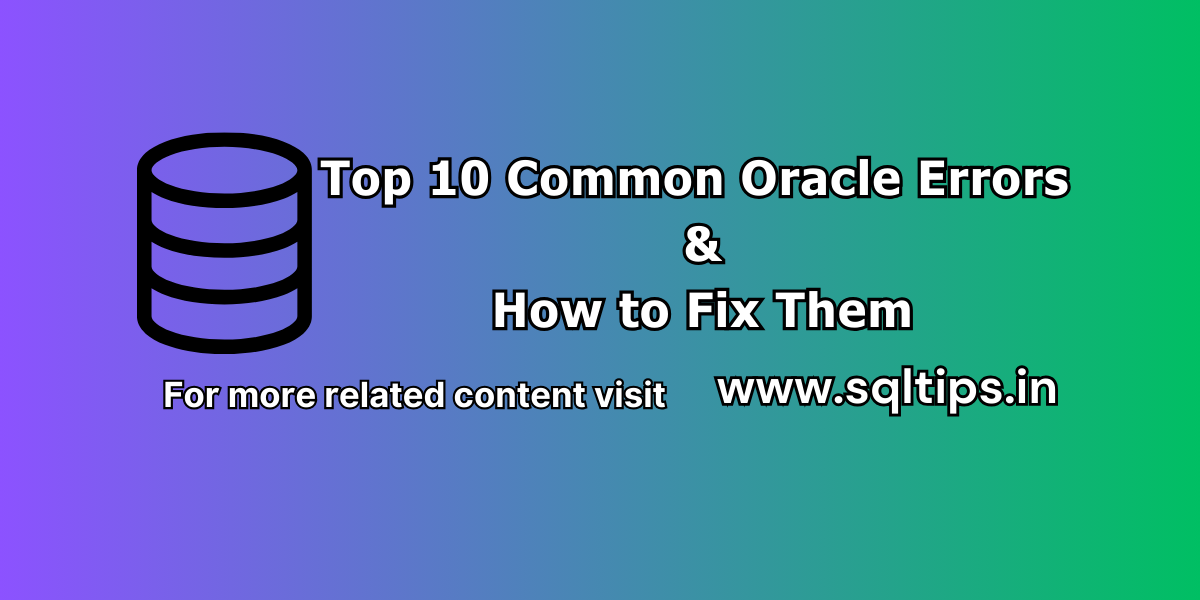1.Definition:
the main difference between SQL and plsql are below
SQL :
- SQL, which stands for Structured Query Language, is a programming language utilized for interacting with and managing relational databases.
- It allows users to create, read, update, and delete data stored in a structured format.
- With SQL, you can carry out operations like retrieving specific data from a database, adding new data, modifying existing information, and even creating new tables.
PLSQL :
PL/SQL, which stands for Procedural Language extensions to SQL, is a powerful programming language developed by Oracle Corporation.
Main Difference between SQL and PLSQL :
| SQL | PL/SQL |
| Sql is Structured Query Language | Pl/sql is Procedural language extension on sql |
| Sql directly interacts with database server | Plsql won’t interacts directly with database server |
| Sql won’t support for loop, if conditions | Plsql support for loop, if conditions, while loop |
| Sql won’t support variables | Plsql support variables and data types |
| Sql is data oriented language | Plsql is application oriented language |
| Sql is mainly used to manipulate data | Plsql is mainly used to create an application |
| At a time in sql we can execute only one statement | At a time in plsql we can execute multiple statements |
2.Execution fo SQL & PLSQL Engines:
- SQL is executed one statement at a time.
- PL/SQL is executed as a block of code containing multiple SQL statements along with procedural logic.

3.Type of Language:
- SQL is a declarative language, focusing on what data to retrieve or manipulate.
- PL/SQL is a procedural language, which allows defining how to perform operations with control structures.
4.Operations:
- SQL is mainly used for data manipulation (SELECT, INSERT, UPDATE, DELETE) and data definition (CREATE, ALTER, DROP).
- PL/SQL can perform complex operations with variables, conditions, loops, and can handle business logic.
5.Error Handling:
- SQL has limited error handling capabilities.
- PL/SQL provides robust error handling through exception handling blocks.
6.Use Cases: When to Choose SQL or PL/SQL
- SQL is ideal for data retrieval and manipulation tasks.
- PL/SQL is suitable for developing applications requiring complex logic, stored procedures, triggers, and functions.
Why to learn PL/SQL?
Advanced Database Programming:
PL/SQL allows you to write complex and efficient database applications. With procedural logic like loops, conditions, and error handling, you can create more sophisticated data processing and business logic compared to using only SQL.
Tight Integration with SQL:
PL/SQL is tightly integrated with SQL, making it easier to perform database operations. You can combine SQL queries with procedural constructs, enabling seamless data manipulation.
Improved Performance:
PL/SQL reduces network traffic by allowing multiple SQL statements to be executed in a single block. This reduces the need for numerous client-server round trips, resulting in faster application performance.
Strong Error Handling:
PL/SQL provides robust error-handling capabilities using exceptions. This helps in managing unexpected errors gracefully and ensuring your applications are more reliable and maintainable.
Reusable Code with Modular Programming:
You can create stored procedures, functions, and packages in PL/SQL, allowing you to encapsulate logic and reuse code across different applications. This makes maintenance easier and reduces redundancy.
Enhanced Security:
PL/SQL helps in maintaining data security by encapsulating business logic in stored procedures and functions, controlling direct access to the database tables. You can grant limited access to specific users, enhancing overall data security.
Career Opportunities:
PL/SQL is widely used in enterprises running Oracle databases. Proficiency in PL/SQL opens up various job opportunities, such as database developers, data analysts, and backend developers.
Ideal for Building Data-Driven Applications:
PL/SQL is ideal for creating applications that require complex data manipulation, such as financial systems, ERP applications, and large-scale data processing solutions.
Interoperability with Other Programming Languages:
PL/SQL can be integrated with languages like Java, .NET, and C#, allowing you to build full-fledged applications using the best features of different technologies.
Automating Repetitive Tasks:
With PL/SQL, you can automate regular database tasks, such as data cleansing, report generation, and batch processing, saving time and effort.
These reasons make PL/SQL an essential skill for anyone working with Oracle databases, especially if you want to develop advanced, efficient, and secure data-driven applications.
Conclusion
In summary, while SQL is the foundation for interacting with relational databases, PL/SQL extends this functionality by adding procedural capabilities, making it ideal for handling complex business logic and data processing tasks. Understanding the differences between SQL and PL/SQL can help you choose the right tool for your specific requirements, whether it's simple data queries or advanced database applications. Mastering both will equip you with a versatile skill set that's highly valuable in the world of database management.




1 thought on “Difference between SQL and PLSQL?”